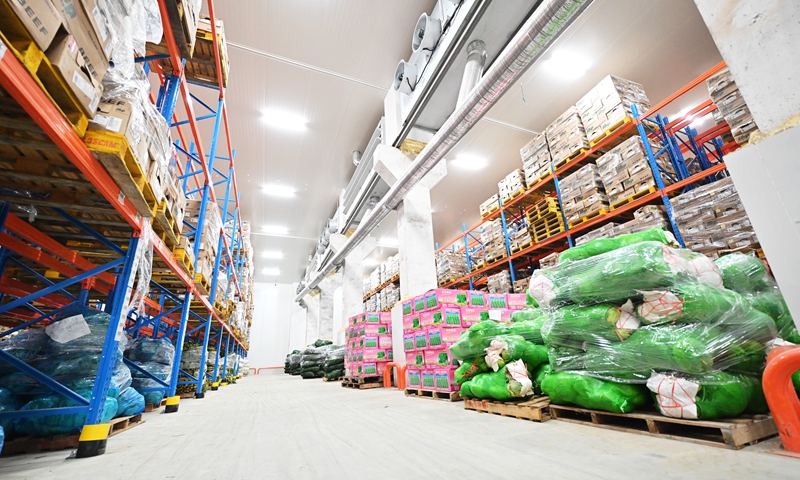
Pictured is a warehouse for vegetables in Fengxian district, Shanghai with a storage capacity of 1,200 tons of vegetables. Photo: VCG
Shanghai's market regulators have increased the supervision of household goods provided to residents during the recent COVID-19 outbreak and made public several cases of food safety violations.
The packaging of some bags of vermicelli indicated that they were produced by a manufacturer in 2022. However, this factory was in fact shut down in 2020. The supplier of the vermicelli is now under investigation.
Another company was filed for investigation for marking false production dates on products. The package of a batch of soy sauce ribs distributed to Shanghai citizens had two production dates of November 2021 and April 2022. The source of the product is currently being traced.
The market supervision bureau of Shanghai's Songjiang district received complaints from residents that the pork meat, sold by Shanghai Xinzhi Food Development Co, was tainted with pieces of pig nipples and had been marked as high-quality pork belly, which is illegal.
The company was found to have packaged the substandard pork meat as "high-grade pork belly" and sold it at high prices in cooperation with its distributors in the face of shortages of necessities during the pandemic. About 658 meat packages with a value of more than 120,000 yuan ($18,470) were sold by the food producer.
The public security organ has taken criminal compulsory measures against the legal representative of the company concerned and the distributor suspected of selling counterfeit and products of inferior quality.
A man surnamed Shang, under investigation in another case, took advantage of the convenience of working as a security guard in a residential community in Yangpu district, purchased a large number of daily necessities under the pretext of "guaranteeing supplies" and sold them at higher prices in the WeChat group of the community.
As of April 20, more than 20 batches of fresh vegetables, fruits and other daily necessities were sold by Shang, making illegal profits of more than 20,000 yuan ($3,100).
Shang is suspected of engaging in business activities without obtaining business certification and is under investigation.
Last week, some Shanghai residents took to social media platforms to share that they had experienced some problems with food distributed by the local authorities or purchased online. For example, residents reported rotten vegetables, stale meat or rice noodles that were produced by manufacturers without certifications.
The city's market regulators quickly stepped in to tackle the problems concerning the quality of supplies.
Related authorities will crack down on illegal cases with zero tolerance, Yin Xin, spokesperson of the Shanghai municipal government, said during Thursday's press briefing, encouraging Shanghai residents to report such problems through the 12315 consumer complaint hotline.
Shanghai's market supervision departments promised again on Sunday to continue to increase supervision, promptly investigate and deal with food safety violations during the community lockdown and protect the legitimate rights and interests of the people.




